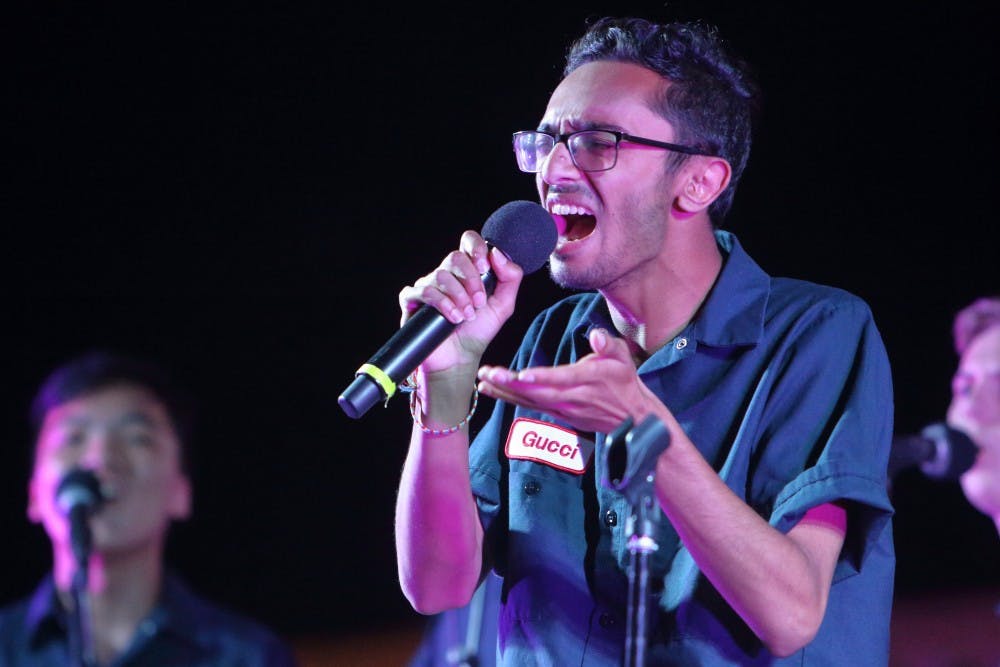For someone who doesn’t attend U.Va., it’s hard to explain what a large part of the undergraduate experience — a cappella — is. For those who choose not to be personally involved with a cappella, the musical groups are still present all over Grounds. Going to see an a cappella group’s fall or spring concert is a social event for many students, and for students who don’t want to pay to see the groups, free performances like Rotunda Sing and Lighting of the Lawn can be found year-round.
Judging from the entertaining and seemingly effortless performances U.Va.’s a cappella groups put on, a cappella may seem closer to a high-energy social club than a group of highly elite vocalists, but the intensity of the audition process supports the latter. Any given a cappella group is likely to be one of the most competitive groups to join on Grounds with auditions beginning the first week of school. In an average year, a cappella groups may listen to over 100 auditions between Thursday and Friday of the first week, offer callbacks to a dozen and ultimately take less than five. The numbers vary depending on the year and the group, but the level of competition stays constant.
The first round of auditions is focused on talent alone.
“If we don’t think someone is able to match with the group musically there’s nothing we can do about that,” Myles Stremick, a third-year Engineering student and the president of an all-male group, the Academical Village People, said.
Auditionees who are talented enough to score a callback find themselves invited to social events on Saturday before they ultimately must perform again on Sunday. The New Dominions, one of the co-ed a cappella groups on Grounds, hosts “callback cocktails” as a get-to-know-you event. Stephen Diggs, a fourth-year College student and president of the New Dominions, said that the social event is completely optional and works to bring down the stress level “so the audition process doesn’t seem so scary.”
Alternatively, all-female group Hoos in Treble eats Bodo’s on the Rotunda steps with prospective members. However, these social events are hardly mandatory. Both the New Dominions and Hoos in Treble admit they have current members who were accepted, despite missing out on this aspect.
“I think the social thing is one of those things that can only help you and can’t really hurt you,” Dani Bhadare-Valente, a third-year College student and the president of Hoos in Treble, said.
It may seem daunting for first year students to prepare to audition within only days of being on Grounds, but Diggs said waiting until the following year may put students in a worse position.
“The complicated thing about older-classmen is — if we already have five second years — then it’s hard to add another second year to that class,” Diggs said. “First years don’t have someone already in the group that they have to compete against, so it’s a little easier.”
This isn’t the attitude for all a cappella groups. Myles Stremick, a third-year Engineering student and the president of an all-male group, the Academical Village People, said his group doesn’t focus so much on first-year students.
“We actually don’t take that many first years…Our fall semester, we usually only ever have one or two first years.”
The Academical Village People are unique in that they routinely hold auditions in the spring as well.
“We’re definitely not afraid to take people in the spring semester or in the fall when they’re second years,” Stremick said.
While musical ability provides the baseline, acceptance into a group can hinge on a variety of factors. For the girls of Hoos in Treble, personality is important.
“We are a group that really prides ourselves on just being nice,” Valente said.
While Valente said that personality was not the only factor, getting along with the group ultimately weighed heavily on their decisions.
“You’re choosing your friends for the next four years, so you’re not going to take someone that you really don’t like,” she said.
For the Academical Village People, the group looks for individuals with characteristics that match their on-stage persona.
“Since we’re AVP, we’re always rocking out and trying to have a good time,” Stremick said. “If we don’t think they’re able to do that, we can’t take them.”
The ultimate deliberation over deciding who to accept often depended on what niche needed to be filled.
“A lot of it does come down to — do we need more higher parts in the group right now? Do we need more lower parts?” Stremick said. “ And it’s just a gamble.”
These dynamics can shift around from year to year, so students who find themselves cut from a group one year shouldn’t immediately count themselves out. Valente, who didn’t get into an a cappella group until her second year, said students should not get discouraged.
“People do slip through the cracks — not because they’re not good, but just because there are so many people,” she said. “I just don’t want anyone to feel as if they should be scared to come out.”







